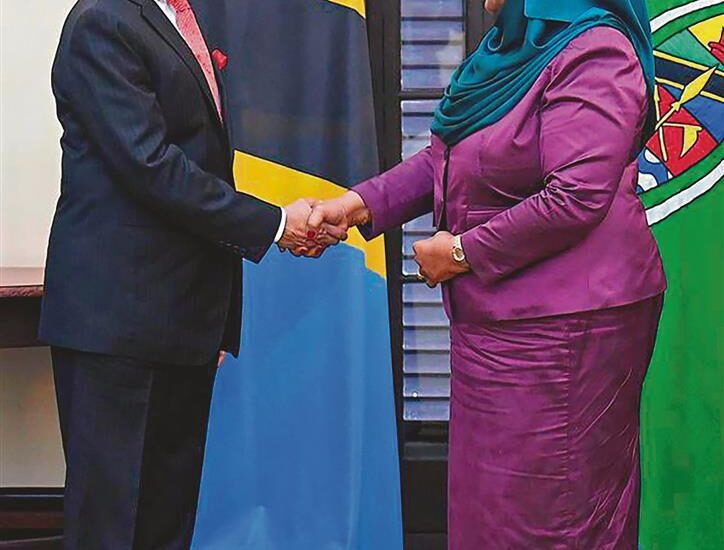Human resource development drives India-Tanzania ties
- August 20, 2023
- Posted by: admin
- Category: India

The decision to set up an IIT campus in Zanzibar underlines people-to-people relationship in India-Tanzania ties.


Gurjit Singh
Former Ambassador
AN agreement to set up the first overseas IIT campus was the highlight of External Affairs Minister S Jaishankar’s visit to Tanzania last week. IIT-Madras and the government of Zanzibar have tied up to establish this institution.
Tanzania is not a surprise choice for this initiative. Located on Africa’s east coast, which is strategically important to India, Tanzania has had a time-tested relationship with India since Independence. It is considered close to China, but has not vacillated in engaging with India.
The diplomatic ties are augmented by strategic coherence and expanding economic relations. Last year, Adani Ports and SEZ Ltd and Abu Dhabi Ports Group agreed to make Tanzania a maritime hub through investments in port infrastructure. Among these are a $500-million three-berth expansion at Dar es Salaam port; a $1-billion port in Bagamoyo; a $600-million plan for the Mangapwani multipurpose port in Zanzibar; and a $300-million investment in a petroleum wharf in the Dar es Salaam harbour.
The bilateral trade increased by 40 per cent to reach $6.4 billion in 2022-23. This has a large component of refined petroleum exports and pharmaceuticals from India. Tanzania is among the countries that have optimally utilised the duty-free tariff preference scheme and attracted Indian investment in agricultural products, among others. Cashew, spices and pulses have augmented Tanzanian exports to India; earlier, it was mainly gold. India is now Tanzania’s largest export market.
India has investments to the tune of $4 billion in Tanzania. India is among the top five investors in Tanzania. Hospitals, pharmaceuticals, veterinary vaccines and mining are among the leading sectors for investments. A 55,000-strong diaspora supports economic interaction and has spurred nurturing of the bilateral relationship over the decades.
India has $12 billion in concessional lines of credit spread across Africa. Over $1 billion of it is in Tanzania alone. The African country is among the top recipients and efficient utilisers of Indian credit lines.
The impact of these India-funded projects is huge. The water projects cater to 28 Tanzanian cities and provide regular water supply to 8 million people.
Tanzania’s Command and Staff College was set up with Indian assistance. An Indian military training team is located there for academic upgradation. Indian naval ships visit Tanzania regularly. Jaishankar participated in a reception on board INS Trishul in Zanzibar.
A key aspect of the India-Tanzania engagement is the people-to-people relationship, particularly focusing on human resource development. This is manifested by the decision to set up an IIT campus in Zanzibar. Tanzania has education and scientific research as an important component of its development plans. The IIT will contribute to the development of Tanzanian human resources, giving it a cutting edge in Africa. It will open its doors to students from East Africa and then from the entire continent.
India is going ahead with opening higher education institutions in one of Africa’s LDCs (least developed countries). The curriculum will be designed by IIT-Madras; degrees will be jointly provided; the investment in the institution will be from the governments of Zanzibar and Tanzania. This makes it a partnership model rather than a donor model. The IIT will offer programmes in the third quarter of 2023; it will also plan pedagogical strategies. This initiative will internationalise Indian education, enhancing the country’s stature and strategic partnerships. This is based on the recommendation of a 16-member committee of the IIT Council to prepare for establishing overseas campuses. The committee, in its 2021 report, recommended that IITs should take the initiative. This decision augments India’s G20 chairmanship and leadership in the Global South.
The India-Tanzania Centre of Excellence in Information and Communication Technology (ICT) was set up at the Dar es Salaam Institute of Technology in 2009; the ICT Resource Centre at the Nelson Mandela African Institution of Science & Technology came up in 2016. The record of Tanzanian youth benefiting from these initiatives has been impressive. The Mandela institute is part of the network of pan-African institutions of science and technology.
Tanzania is among the leading beneficiaries of the Indian Technical and Economic Cooperation (ITEC) programme and scholarships offered by the Indian government. Its 84 per cent utilisation rate is among the highest for African countries. When it comes to foreign students studying in India, the strength of Tanzanian students is among the highest. Tanzania was among the largest users of the Raman fellowships for science and technology and the agriculture fellowships under the India-Africa summit programmes.
This consistent experience in engaging with Tanzania gave IIT-Madras the confidence that it would be able to set up a campus in Zanzibar. The island is in a unique federative relationship with Tanzania. While Tanganyika had a German and British colonial experience, Zanzibar remained independent and joined Tanganyika upon independence in 1964, together forming Tanzania. Zanzibar is where Mahatma Gandhi spent a fortnight on his way to South Africa.
Zanzibar successfully implemented the Solar Mamas programme, under which rural women were trained to become solar engineers and electrify their villages. Zanzibar hosts their training centre, supported by its government and India’s Ministry of External Affairs.
Tanzania is an Indian Ocean neighbour, being a member of the Indian Ocean Rim Association, which has been consistently engaging with India and making the most of development cooperation initiatives. It has integrated them into its own development plans and provided the necessary local support. The relationship is providing a level playing field for Indian economic interests.
